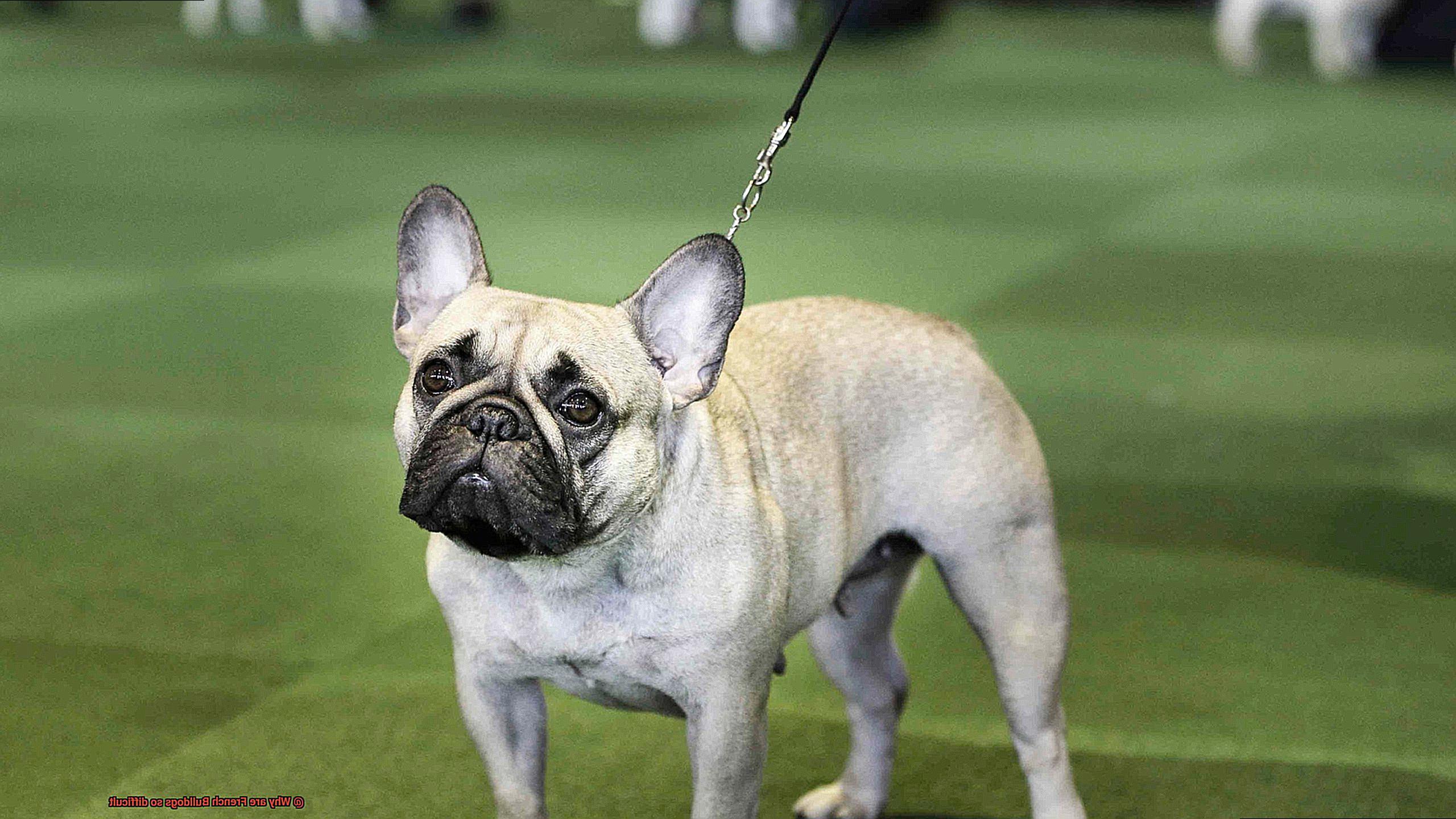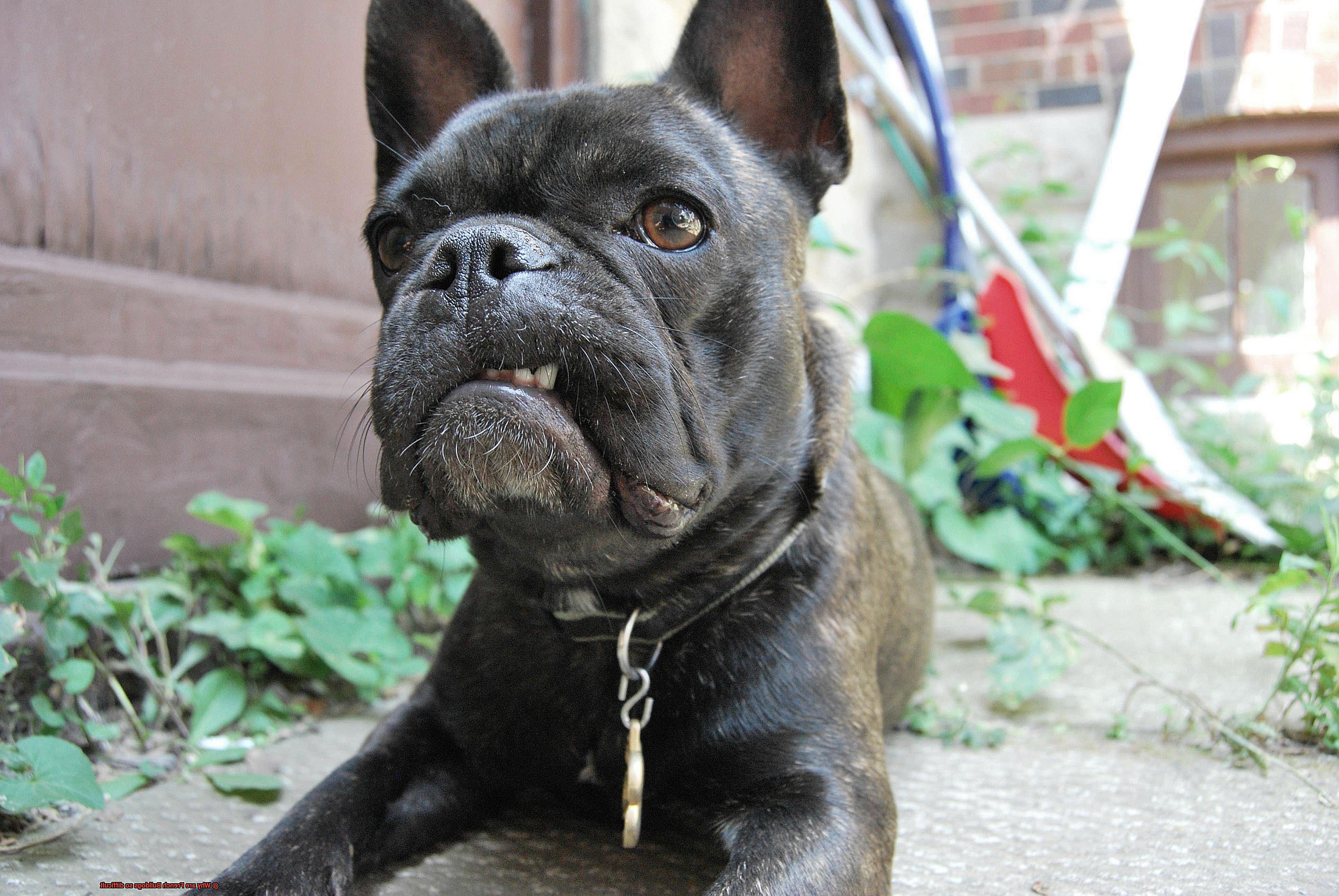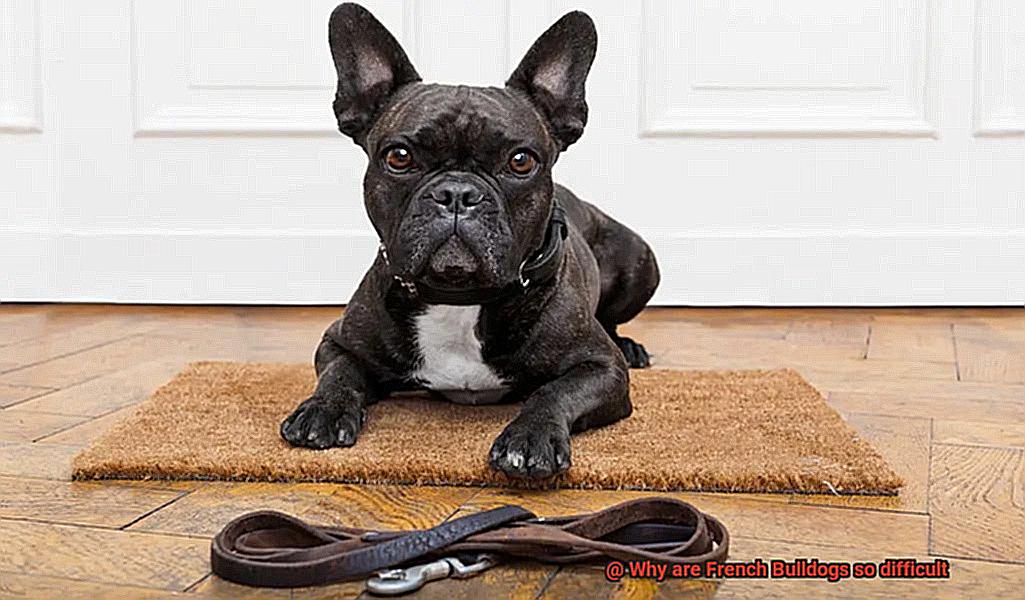Why are French Bulldogs so difficult?
Prepare to be enchanted by their petite frames, irresistible cuteness, and larger-than-life personalities. French Bulldogs have a way of stealing hearts worldwide with their expressive eyes and adorable bat-like ears. But as any seasoned owner will tell you, behind that lovable facade lies a breed that can be quite challenging to handle.
Don’t fret just yet. Unraveling the enigma of French Bulldogs is where the real adventure begins. Join us on a journey to understand why these four-legged companions are notorious for their mischievous antics, stubborn streaks, and unique set of quirks.
One of the main reasons why French Bulldogs are often labeled as difficult is their sheer stubbornness. While many breeds are known for their intelligence and eagerness to please, these little bulldogs have a mind of their own. They march to the beat of their own drum, making training sessions an exercise in patience and creativity.

Picture this: You’re trying to teach your Frenchie basic commands like “sit” or “stay,” only to be met with that adorable yet unwavering expression on their face. It’s as if they’re silently telling you, “I hear you, but I’ll do things my way.” Oh, the audacity.
Moreover, French Bulldogs come with sensitive stomachs and a predisposition to various health issues. From allergies to skin irritations and the infamous brachycephalic airway syndrome, they require extra care and attention. Their respiratory difficulties make them more susceptible to heat or strenuous exercise, demanding vigilant management for their well-being.
But let’s not forget what makes them truly special. Despite the challenges they present, French Bulldogs possess an inherent charm that keeps owners coming back for more. Their affectionate nature knows no bounds, and their loyalty is unwavering — a bond that makes every hurdle seem trivial.
So, are French Bulldogs really difficult? Yes, but understanding their unique traits and needs allows us to appreciate the immeasurable rewards of owning one of these charismatic canines. In this captivating blog series, we’ll dive deep into the intricacies of raising a French Bulldog, offering invaluable insights, practical tips, and expert advice on navigating the challenges for a harmonious life with your furry companion.
Stay tuned as we explore the fascinating world of French Bulldogs, unravel their endearing idiosyncrasies, and embark on an extraordinary
Temperament and Behavior: Reasons Why French Bulldogs Can Be Difficult
Contents [show]
French Bulldogs are undoubtedly adorable and charming companions, but they come with their fair share of challenges. Their unique temperament and behavior traits can make them difficult to manage and train. In this article, we will explore the reasons behind these challenges and provide practical tips for pet owners to create a harmonious relationship with their French Bulldogs.
Independent Thinkers: The Stubbornness Factor

French Bulldogs are known for their strong-willed nature, making training and obedience a challenge. Their independent thinking often leads them to choose their own way over following commands. To overcome this, consistency, positive reinforcement, and patience are key. By using rewards-based training methods and establishing clear boundaries, you can gradually shape their behavior.
Separation Anxiety: The Bonding Dilemma
French Bulldogs form deep bonds with their owners, which make them prone to separation anxiety. When left alone for long periods, they may exhibit destructive behaviors such as chewing furniture or excessive barking. To alleviate this, gradually accustom your Frenchie to being alone by starting with short separations and gradually increasing the duration. Providing mental stimulation through interactive toys or leaving a piece of clothing with your scent can also help ease their anxiety.
Aggression Concerns: Addressing Potential Issues
While not all French Bulldogs display aggression, some may exhibit territorial aggression or become possessive over food or toys. Early socialization and professional guidance are essential in addressing any signs of aggression. Properly introducing your Frenchie to other dogs, people, and various environments will help them develop positive social skills.
Physiological Challenges: The Snorting Symphony
French Bulldogs are notorious for their snoring, snorting, and flatulence due to their unique skull structure. These characteristics can be challenging for individuals who are sensitive to noise or have respiratory issues. While you cannot change their physical traits, you can minimize discomfort by keeping them in a cool environment, avoiding hot weather, and providing appropriate veterinary care.
Energy Levels: Finding the Balance
French Bulldogs are not the most active breed and tend to have low energy levels. However, without proper exercise and mental stimulation, they can become restless and exhibit behavioral issues. Regular walks, interactive playtime, and puzzle toys can help channel their energy in a positive way, preventing weight gain and obesity.
High Energy Levels: How to Manage Their Restless Nature
With the right approach, managing their restless nature is possible. This blog post explores the importance of physical exercise, mental stimulation, and providing a safe and stimulating environment for your furry friend.
Physical Exercise:
- Daily Walks: Engage in brisk walking sessions for at least 30 minutes to an hour each day to burn off excess energy.
- Interactive Playtime: Keep your Frenchie active and entertained with engaging toys like balls or frisbees.
- Doggy Sports: Agility training or obedience classes provide mental and physical stimulation.

Mental Stimulation:
- Puzzle Toys: Invest in toys that challenge problem-solving skills to keep your Frenchie mentally engaged.
- Training Sessions: Teach new tricks or commands to sharpen their minds and focus.
- Nose Work: Stimulate their natural hunting instincts by hiding treats or engaging in scent games.


Safe and Stimulating Environment:
- Socialization: Introduce your French Bulldog to various people, animals, and environments early on to prevent fear or anxiety triggers.
- Separation Anxiety Prevention: Avoid leaving them alone for extended periods; instead, provide toys or puzzle feeders for entertainment.
- Routine and Structure: Establish a consistent daily schedule for meals, walks, playtime, and training sessions to create stability.

Temperature Sensitivity: Providing Special Care in Hot Weather
French Bulldogs are undeniably adorable with their unique looks and playful personalities. However, their short noses and compact airways make them particularly vulnerable to hot weather. As responsible pet owners, it is our duty to provide special care and take necessary precautions to keep our furry friends safe and comfortable during scorching summer days. Here are some tips to help you beat the heat and ensure your French Bulldog stays cool as a cucumber.
Recognizing the Signs of Heat Stress:
Knowing the signs of heat stress is crucial for early intervention. Keep an eye out for excessive panting, drooling, rapid breathing, lethargy, and even collapse. If you notice any of these symptoms, it’s time to take action.
Create a Cool Oasis:
Provide your French Bulldog with a cool and shaded environment. Keep them indoors with air conditioning or fans to keep the temperature down. If they must be outside, make sure they have access to shaded areas or use umbrellas or canopies to create a cozy oasis.
Hydration is Key:
Just like us, French Bulldogs need to stay hydrated in hot weather. Ensure that fresh water is readily available at all times. You can add ice cubes to their water bowl or invest in a pet fountain to entice them to drink more.
Timing is Everything:
Avoid taking your French Bulldog for walks or engaging in vigorous exercise during the hottest parts of the day. Opt for early morning or late evening outings when temperatures are cooler.
Get Stylishly Cool:
Consider using cooling mats or vests to help regulate your French Bulldog’s body temperature. These specially designed products provide a refreshing cooling sensation that can make a world of difference.
Sun Protection:
Just like humans, dogs can get sunburned too. Protect your French Bulldog’s sensitive areas, such as their ears, nose, and belly, by applying sunscreen specially formulated for dogs. This simple step can prevent painful sunburns and potential skin issues.
Grooming Matters:
Regular grooming not only keeps your French Bulldog looking sharp but also helps them stay cool. Trim their coat to reduce thickness, making it easier for air to circulate and heat to escape.
Never Leave Them Alone:
Under no circumstances should you leave your French Bulldog alone in a car or any confined space without proper ventilation. The temperature inside a car can rise rapidly, leading to heatstroke within minutes. Always prioritize their safety and well-being.
Separation Anxiety: Dealing with Destructive Behaviors
This deep bond can sometimes lead to separation anxiety, causing distress for both the dog and their caregiver. In this comprehensive guide, we will explore the signs and effects of separation anxiety in French Bulldogs, and provide effective strategies for managing and overcoming destructive behaviors associated with this condition.
Understanding Separation Anxiety:
Separation anxiety is a common condition in which dogs experience intense fear and distress when separated from their owners or left alone for extended periods of time. French Bulldogs, being social beings by nature, are more prone to developing separation anxiety due to their strong emotional connection with their humans. Some telltale signs of separation anxiety in French Bulldogs include excessive barking, destructive chewing, indoor accidents, pacing, and restlessness.
Counterconditioning: A Gradual Approach to Calmness:
Counterconditioning is a highly effective method for managing separation anxiety in French Bulldogs. This technique involves gradually desensitizing your furry friend to being alone by associating positive experiences with alone time. Begin by introducing a special treat or toy that they only receive during alone time. Start with short periods of separation and gradually increase the duration while providing positive reinforcement. This gradual approach helps your French Bulldog develop a more positive association with solitude.
Establishing a Consistent Routine:
Creating a consistent daily routine can provide structure and predictability, which can alleviate separation anxiety in French Bulldogs. Establish regular feeding times, exercise sessions, and playtime to give your dog a sense of security. Additionally, incorporating mental stimulation through puzzle toys or interactive games can keep them occupied and reduce anxiety when left alone.
Calm Departures and Arrivals:

When leaving or returning home, it’s crucial to maintain a calm demeanor. Avoid making a big fuss as this can reinforce your French Bulldog’s anxiety. Instead, adopt a low-key approach to help them feel more at ease. By downplaying departures and arrivals, you can help your furry friend understand that being alone is a normal part of their routine.
Seeking Professional Help:
In severe cases of separation anxiety, seeking professional help from a dog trainer or behaviorist specializing in this issue may be necessary. These experts can provide tailored guidance and techniques to address your French Bulldog’s specific needs.
Patience and Understanding:
Dealing with separation anxiety in French Bulldogs requires patience, consistency, and understanding. It’s crucial to remember that this behavior is not a result of disobedience or spitefulness but rather a genuine fear and distress experienced by your beloved pet. With time, proper training, and unwavering support, your French Bulldog can learn to feel more secure and comfortable when left alone.
Health Issues: Respiratory Problems, Skin Allergies, and Back Pain
French Bulldogs are undeniably adorable with their unique appearance and playful personalities. However, they also come with a set of health issues that can be quite challenging to manage. Let’s delve into three common health problems faced by French Bulldogs – respiratory issues, skin allergies, and back pain – and explore how we can address them to keep our furry friends happy and healthy.
Firstly, let’s talk about respiratory problems. Due to their short snouts and flat faces, French Bulldogs often struggle with breathing properly. This condition, known as brachycephalic syndrome, can cause respiratory distress, snoring, and even collapse in severe cases. To help our Frenchie breathe easier, it’s crucial to keep them cool and avoid strenuous activities that could strain their airways. Regular veterinary check-ups are essential for monitoring their respiratory health and addressing any issues that may arise.
Moving on to skin allergies, French Bulldogs have sensitive skin that can easily become irritated by environmental allergens like pollen, dust mites, and certain foods. This can lead to itching, redness, and hair loss. To maintain our Frenchie’s skin in tip-top shape, we need to keep their living environment clean and free from potential allergens. A healthy diet that is free from common allergens can also help reduce the chances of skin allergies cropping up.
Last but not least, let’s tackle back pain. French Bulldogs have a compact and muscular build, which puts strain on their backs. This can result in intervertebral disc disease (IVDD), a condition where the discs between the vertebrae degenerate or herniate.
To prevent back pain in our Frenchie, it’s important to avoid activities that put excessive strain on their backs, such as jumping off high surfaces.
Regular exercise is still crucial for their overall health but being mindful of their limitations is key. If we notice any signs of back pain, like weakness in the hind legs, seeking veterinary care immediately is essential.
Training and Socialization: Establishing Boundaries and Rules
French Bulldogs are undeniably adorable, but their stubborn nature can make training and socialization a bit challenging. However, with the right approach and consistent effort, you can help your French Bulldog become a well-behaved and sociable companion. In this article, we will explore the importance of setting boundaries and rules during the training and socialization process.
Starting Early: The Power of Socialization
Socializing your French Bulldog from a young age is crucial for their development. Early socialization helps them become comfortable in various situations, such as meeting new people or encountering other animals. Positive experiences during this critical period can shape their behavior and prevent potential issues in the future.
Consistency is Key: Establishing Clear Boundaries
French Bulldogs respond well to clear boundaries and rules. By consistently enforcing these boundaries, you help them understand what is expected of them. Positive reinforcement techniques, such as treats, praise, and rewards, can motivate them to follow commands and engage in desired behaviors.
Fun and Engaging Training Sessions
French Bulldogs have a limited attention span, so breaking up training into short, fun sessions throughout the day is more effective than long, tedious sessions. Use positive reinforcement techniques to keep them engaged and motivated.

Patience and Persistence: It’s Worth the Effort
Training a French Bulldog requires patience and persistence. While they may be stubborn at times, with consistent practice and reinforcement, they can eventually learn and comply. Remember to celebrate small victories along the way.
Mental Stimulation: Keeping Their Minds Active
Providing mental stimulation through interactive toys, puzzles, or games is important for preventing boredom in French Bulldogs. This helps keep their minds active and prevents behavioral problems that can arise from lack of mental stimulation.
Gradual Socialization: Exposing Them to New Experiences
Socializing a French Bulldog involves gradually exposing them to different environments, people, animals, and situations in a controlled and positive manner. This helps them become more comfortable and confident in new situations.
Seeking Professional Guidance: Obedience Classes and Trainers

Enrolling in obedience classes or working with a professional dog trainer can be beneficial for both the owner and the French Bulldog. Trainers can provide guidance on how to effectively train and socialize the breed while addressing any specific challenges or concerns.
Stimulating Environment: Keeping Your Frenchie Mentally Engaged
French Bulldogs are not only known for their adorable looks and affectionate nature, but also for their stubbornness. However, with the right strategies, you can create a stimulating environment that keeps your Frenchie mentally engaged and helps them overcome their challenges. In this article, we will explore various ways to provide mental stimulation for your Frenchie through interactive toys, training sessions, physical exercise, socialization, and mental enrichment activities.
Interactive Toys:
- Challenge your Frenchie’s mind and keep them entertained with puzzle feeders or treat-dispensing toys.
- Keep things interesting by regularly rotating their toys to prevent boredom.
Training Sessions:
- Motivate and train your Frenchie using positive reinforcement techniques.
- Make training sessions short, fun, and rewarding to keep their minds engaged.
- Establish a strong bond with your Frenchie through consistent training.

Physical Exercise:
- Burn off excess energy and stimulate your Frenchie’s mind with regular walks, park playtime, or agility training.
- Provide an outlet for their natural curiosity and boundless energy.
Socialization:
- Fulfill your Frenchie’s social needs by taking them to dog parks or arranging playdates with other dogs.
- Prevent behavioral issues by allowing them to interact with other friendly dogs.
Mental Enrichment Activities:
- Engage your Frenchie’s mind with hide-and-seek games, scent work, and basic obedience training.
- Strengthen the bond between you and your Frenchie through these mentally challenging activities.
Finding a Reputable Breeder: Prioritizing the Health and Temperament of Your Dog
French Bulldogs are universally adored for their charming personalities and distinctive features. However, it is vital to prioritize the health and temperament of your dog when searching for a reputable breeder. In this article, we will explore the importance of these factors and provide valuable tips on finding a responsible breeder who shares your priorities.
Health screenings for a healthier companion:
- Genetic health issues: French Bulldogs are prone to certain genetic conditions such as hip dysplasia, brachycephalic airway syndrome, and spinal problems.
- Thorough health screenings: Reputable breeders prioritize their dogs’ health by conducting comprehensive health screenings on their breeding dogs. This reduces the risk of your dog developing these ailments.
Temperament matters too:

- Strong-willed nature: French Bulldogs have a reputation for stubbornness.
- Breeding for temperament: Responsible breeders carefully select breeding pairs based on temperament to produce puppies that are friendly, stable, and well-suited to family life.
- Importance of socialization: Puppies should be exposed to various people, animals, and environments from a young age to develop into well-rounded individuals.
- Choosing a breeder who prioritizes socialization: Look for breeders who understand the significance of early socialization in shaping your dog’s behavior.
Ongoing support and guidance:
- Responsiveness and availability: A reputable breeder provides ongoing support and guidance to new owners.
- Reliable source of information and assistance: Breeders should be available to answer questions and offer advice on training, nutrition, and general care throughout your dog’s life.
The importance of research and patience:
- Thorough research: Seek recommendations from trusted sources like veterinarians, breed clubs, or fellow dog owners.
- Visiting the breeder’s facility: Assess living conditions and observe the behavior of the dogs.
- Patience and waiting lists: Reputable breeders may have waiting lists as they prioritize the health and welfare of their dogs. Be patient and choose quality over expediency.
Em5WE9QFfa0″ >
Conclusion
French Bulldogs can be quite a handful.
Their adorable appearance may deceive you, but they come with their fair share of challenges. From stubbornness to health issues, these little pups demand attention and patience.
Training a French Bulldog requires consistent effort and determination. They have a strong will and can be quite stubborn at times.
This breed is notorious for being difficult to housebreak, which can be frustrating for owners. Additionally, French Bulldogs are prone to various health problems due to their unique anatomy.
Their short snouts make them susceptible to respiratory issues and overheating. These factors contribute to the overall difficulty of owning a French Bulldog.
However, despite the challenges they present, the love and companionship they offer make it all worthwhile in the end.




